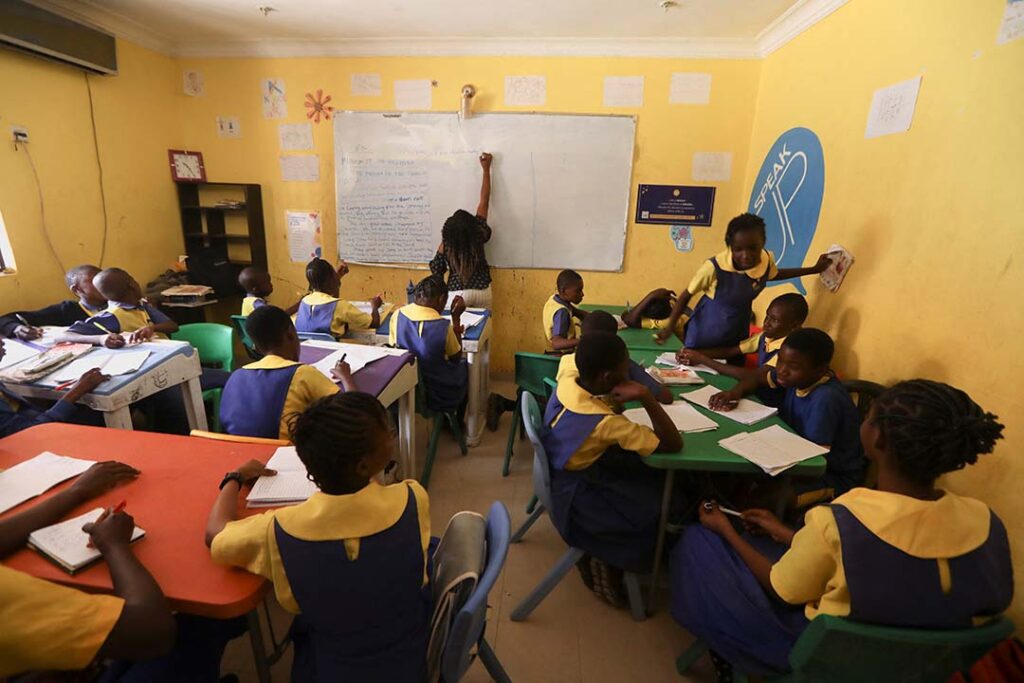ADF STAFF
Even before the onset of COVID-19, Nigeria had the world’s highest number of school-age children who did not attend school.
The pandemic has made everything worse.
Lockdown measures to prevent the pandemic’s spread reduced children’s school attendance throughout the country, particularly among students aged 15 to 18, according to a 2021 World Bank study. For Nigerian students in that age group, school attendance is not free or mandatory.
During the pandemic, many Nigerian families stopped sending older students back to school so they could earn money and support the family. The World Bank study suggested that “such discontinuation [of education] is likely to lead to school dropout.”
Unequal access to educational opportunities and a lack of technology for remote learning exacerbated the challenges of an education system already in crisis, said Habeeb Saleh, former program manager of Kano Literacy and Mathematics Accelerator program.
The learning loss experienced during COVID-19 has a chance to have a long-term impact on the country’s “human capital,” a group of important wellness and education indicators that are connected to economic growth.
“COVID-19’s impact on the delivery of health and education services could have more profound long-term consequences for Nigeria’s human capital development,” the Brookings Institution wrote in a 2022 report.
About 13.2 million Nigerian children of school age typically do not attend school due to poverty, religious and other factors including violence, according to an April 2020 University of London report.
“We hope to share lessons learned on foundational skills programming and discuss sustainable approaches for the future to help children in Nigeria catch up on foundational reading and mathematics skills,” Saleh said in a report by the British newspaper The Guardian.
Preliminary results of the 2020 National Learning Assessment showed that more than 55% of fourth-grade students could neither read fluently nor with comprehension. The same year, a Nigeria Education Data Survey showed that less than 67% of students from 12 to 14 years old could read at least one of three words, while just more than 67% of students in the same age group could add single digits, according to The Guardian.
TaRL Country Manager Inyang Udo-Umoren stressed the importance of bolstering children’s understanding of fundamental skills.
“We believe that for children to have good learning outcomes, we need to improve and strengthen the capacity of the teachers to ensure that the learning outcomes are improving, the teachers need a lot of mentoring support,” Umoren said in The Guardian report. “And that mentoring support comes from the government system.”
Nigeria allocates about 7% of its budget to education, although 15% to 20% of a country’s budget is recommended for education by the United Nations Educational, Scientific and Cultural Organization.
In January, the government pledged to increase Nigeria’s annual education budget by 50% over the next two years and by 100% by 2025, UNICEF reported.
“Far too many Nigerian children today are not in the classroom — and for those who are, far too many are not getting a solid education that can translate into good prospects for their futures,” Peter Hawkins, UNICEF representative in Nigeria, said in a news release.
Nigerian students facing the highest hurdles tend to be girls, children with disabilities, children in low-income households, children in rural areas, and children displaced by violence and other emergencies, according to UNICEF.
“We need to look towards communities — leaders, parents, teachers and caregivers — and together, find the best strategies to ensure that all children enroll into school, have access to continuous learning and ensure they emerge with quality skills that equip them for a prosperous future,” Hawkins said.

